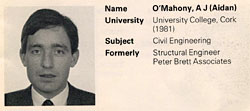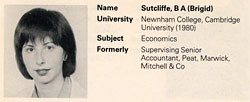A degree of consistency in turbulent times
Simply sign up to the Business education myFT Digest -- delivered directly to your inbox.
Ask the MBA class of 2012 why they decided to go to business school and you will invariably hear one or more of the following: to gain new skills; improve earning power; change career or build a strong network of professional contacts.
Rewind 25 years and the class of 1987 would cite similar goals.
Like their 2012 equivalents, they too were graduating into an uncertain economic climate. “Black Monday”, the 1987 crash that caused widespread panic in the markets and the finance sector, happened in the October of that year, just as the fresh MBAs were either settling into new jobs, or searching in earnest for work.
With hindsight, Black Monday appears less grave than today’s global crisis, but at the time the future looked very worrying. According to the New York Times in December 1987, the Institute for International Economics, a Washington research group, called in 33 eminent economists, including five Nobel Prize winners, to discuss the international economy. Their common conclusion came as a stark warning to policymakers and sounds oddly familiar today: “Unless more decisive action is taken …the next few years could be the most troubled since the 1930s.”
In 1987, 782 people graduated with an MBA from Harvard Business School and 109 gained the degree from London Business School. This year, the figures are expected to be 877 from HBS and 399 from LBS. Indeed, back in 1987 the MBA, in the UK at least, was relatively new and those who opted to study for the two-year management degree were somewhat uncertain where it might lead.
Aidan O’Mahony, now principal at Aeon Hewitt, a consulting group, was an engineer in his mid-20s when he decided to apply to LBS. He hoped the degree would boost his salary. He was also prompted by a manager, a senior engineer who became ill – due at least in part to financial pressures. He thought to himself, “I don’t want to be here in 25 years.”

Mr O’Mahony’s decision to leave his solid career in engineering and return to full-time education came as a surprise to his family since “doing an MBA was not the done thing in the UK 25 years ago”.
“It [the MBA] was ‘up and coming’. Now, it’s commonplace,” he says.
His classmate Brigid Sutcliffe, consultant with Telos Partners, a management consultancy, was a chartered accountant before embarking on her MBA. Her then boyfriend (now husband) was already studying for his MBA at LBS, so she had some idea of what to expect and could also see the value of the qualification – although she had no specific career goals when she started.

Initially Ms Sutcliffe found some aspects of the programme difficult.
“It felt like a very mixed group in terms of ages and backgrounds, which was challenging at first. But the group assignments forced you to gain a different perspective and become a better manager.”
Across the Atlantic, Ann Sarnoff was working at a small consulting firm when she realised that her colleagues – peers of the same age – were applying to business school, inspiring her to do the same.
“It was intriguing and it seemed that going to business school might open more doors for me,” she says.
“I was 21-22 and I didn’t really have business role models in my life. My parents were working class and weren’t able to go to college, and they worked so hard so that their kids could go to college. But I didn’t have people saying ‘this is what you should do at this point in your life, these are the kind of jobs you should apply to’, so I was very influenced by people I then encountered.”
She was accepted at HBS, a decision that shaped her career path. She is now chief operating officer of BBC Worldwide America.
Carla Harris, managing director at Morgan Stanley, gospel singer and author, also opted for HBS. She had an economics degree from Harvard University, so going on to do an MBA was a natural progression.
“Getting an MBA is one of the few decisions I would make again in a minute,” she says.
Most of the HBS and LBS classes of ‘87 found jobs with relative ease on graduation, despite what was to come.
“It was a pretty flush economy when we graduated, a boom period,” says Ms Sarnoff.
“But, unbeknown to us, we were about to go in to the crash of ’87 – and a lot of people had gone into banking and consulting.” Had the classes graduated just a few months later the situation would have been very different as banks and consultancies reduced hiring, and opportunities became few and far between.
Mr O’Mahony’s decision to study for an MBA has paid dividends throughout his career.
“For me, the behavioural psychology and a move from being a technical specialist to gaining softer skills was important. I learnt to keep quiet, let others talk, wait till they’re exhausted and then you can make progress.”
…
The alumni continue to use today the skills they first learnt at business school.
Ms Sarnoff says: “Communication skills, learning how to manage people, learning how to set goals, those are all things that you learn – it definitely laid down a foundation for me to build general management skills, which I then used pretty prolifically once I’d inherited a business to run, in my case the consumer products division at Nickelodeon.”
But with 25 years worth of hindsight and wisdom, what does the class of 1987 wish it had known?
For Ms Sutcliffe, humility is important: “You emerge thinking you’re a master of the universe, but you’re actually only 27 or 28.
“My advice would be to build on your career; accept a job even if it is not your dream job and use that experience”.
Both Ms Sarnoff and Ms Harris stress the importance of flexibility in a world that is rapidly changing.
“We are in a very dynamic environment,” says Ms Harris. “Goals are a function of what you can see; be open to different career paths.”
Another theme considered important by the alumni is taking on difficult “stretch projects”.
Ms Sarnoff says that these allow you to demonstrate skills not on your CV – and, more generally, the importance of continued learning.
And finally: “Invest in yourself,” says Ms Harris, summing up the main motivation, after all, for MBAs.
Comments